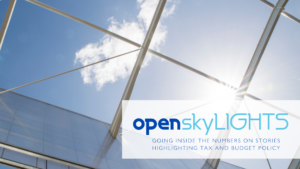
55.6%
When costs surrounding a school improvement project approved by voters in 2022 escalated, the locally-elected school board of Heartland Community Schools discussed this with their community and approved a financing plan to complete the work. Residents were told that repayment through the district’s Special Building Fund would require an increase in the district’s property tax request over a seven-year period.
All of that occurred this spring, before the Legislature approved a 3% revenue cap on public school districts tied into education funding packages. With the revenue cap, OpenSky has long maintained that additional state dollars flowing to public schools are essentially a tax shift and not new funding to help school districts to address growing needs.
For Heartland, the revenue cap meant going back to district patrons to seek approval of the additional property tax request that was previously communicated and approved by the school board. In mail-in voting conducted last month, 55.6% of voters favored the request, but the revenue cap passed by the Legislature required 60% approval. District leaders are now determining if work can continue on the previously approved school improvements.
Read more on tax shift from Nebraska Examiner
Read more on revenue cap from OpenSky
1.1 million
Few states provide age breakdowns of the people losing Medicaid coverage through the “unwinding” process, but in the 15 states that do, 1.1 million children have been dropped in the ongoing eligibility review of all recipients. In response, federal officials warned state Medicaid agencies that technical errors may be to blame for many disenrollments.
Since Nebraska began reviewing Medicaid eligibility this spring, 28,163 recipients lost their health care coverage, although Nebraska does not provide an age breakdown so it’s not clear how many of those recipients are children. That total represents 29% of those Medicaid recipients reviewed in the initial months of the year-long effort known as unwinding. When the unwind began, 393,000 people – about 1 in 5 Nebraskans – were enrolled in Medicaid.
Half of those losing benefits in Nebraska were due to procedural reasons such as failing to provide necessary contact information. As the review continues, it’s important that Nebraskans make sure their information on file with the Department of Health and Human Services is up to date and watch for messages.
Read more on children losing coverage from The New York Times
5.2%
Two provisions of the American Rescue Plan — expansion of the federal Child Tax Credit and a third pandemic stimulus payment — lifted more children above the poverty line in a single year than any piece of legislation enacted in the last 50 years. The year-over-year decline of 4.4 percentage points brought the child poverty rate in 2021 to an all-time low of 5.2%.
Next week, data to be released by the U.S. Census Bureau is expected to show a historic rise in poverty driven by the expiration of pandemic relief, including the expanded Child Tax Credit. An estimated 19 million children — 1 in 4 nationwide — are now ineligible to receive the full $2,000 credit because their families’ incomes are considered too low.
Read more from Center on Budget and Policy Priorities
No. 1
Oliver Anthony’s “Rich Men North of Richmond,” with lines about working for “bull$&@#” pay, rose to No. 1 on the Billboard charts and put a focus on the extent to which working people are taxed compared to rich men.
In Virginia, Anthony’s home state, middle-class, working-class and poor families all pay a larger share of their income in state and local taxes than the top 1%. Nebraska state and local taxes rank even worse on a fairness scale, and that’s even before the latest round of cuts that predominantly benefit the wealthiest 20% of Nebraskans.
0.1%
Fines and fees provide a local revenue source but amount to only 0.1% of Nebraska’s state General Fund revenues. Yet those fines and fees incurred by Nebraska residents disproportionately affect low-income residents, contributing to a cycle of poverty.
Fines and fees will be one of the topics on the agenda for OpenSky Policy Institute’s 2023 Fall Policy Symposium. Register today for the Symposium to be held Tuesday, Oct. 24, from 8:30 a.m. to 12:30 p.m. at Nebraska Innovation Campus.
